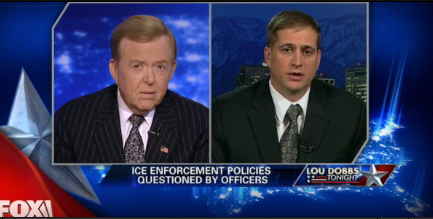Head of National ICE Council blocking staff from taking training to curb inhumane practices

Chris Crane, president of ICE union has decided to make this an electoral issue rather than a moral and humane one. By blocking ICE staff to take part in this training he is effectively undermining a reasonable order by DHS and the president – he is doing it clearly for political and electoral causes, giving fodder to his favorite audience: Conservative blogs, pundits and public officials; his recent appearances with Lou Dobbs, FOX News are more than a glimpse to his rationale.
###
WASHINGTON — The federal agency in charge of deportations is conducting a far-reaching training course to push immigration enforcement officers and prosecutors nationwide to focus their efforts on removing immigrants convicted of crimes.
The training course is the clearest sign yet that administration officials want to transform the way immigration officers work, asking them to make nuanced decisions to speed deportations of high-risk offenders while halting those of illegal immigrants with clean records and strong ties to the country. The policy is President Obama’s most ambitious immigration initiative before the November elections, senior administration officials said.
But in a new sign of the deep dissension over immigration, the union representing some 7,000 deportation officers of the agency, Immigration and Customs Enforcement, known as ICE, has so far not allowed its members to participate in the training. Without the formal assent of the union, the administration’s strategy could be significantly slowed for months in labor negotiations.
Chris Crane, the president of the union, the National ICE Council, has fiercely criticized the strategy, saying it amounts to orders from ICE officials for agents not to enforce the law. In Congressional testimony, Mr. Crane accused the administration of tailoring its enforcement practices to win support from immigrant communities for Mr. Obama’s re-election.
“Law enforcement and public safety have taken a back seat to attempts to satisfy immigrant advocacy groups,” Mr. Crane told a House Judiciary subcommittee in October.
Department of Homeland Security officials say the training seminar, although only half a day, is central to bringing all ICE officers on board for an effort that they say will significantly raise the numbers of convicted criminals among deportees and is expected to lead in coming months to unprecedented suspensions of deportations of tens of thousands of illegal immigrants.
Virtually all ICE commanding officers and prosecutors have gone through the training course and are working on the new strategy, Homeland Security Department officials said. But because of the silence from the ICE Council, a local of the American Federation of Government Employees, the officials will miss their Jan. 13 goal for completing the nationwide training blitz, which began in November.
Mr. Crane has channeled his criticisms primarily through Republican leaders in Congress, working with Representative Lamar Smith of Texas, the chairman of the House Judiciary Committee. Calling the administration’s plan “backdoor amnesty,” Mr. Smith said last week that evidence Mr. Crane presented to the committee showed that directives from ICE officials for agents to use discretion in enforcement decisions had “undermined the agency’s credibility and mission.”
The National ICE Council faces a deadline late this month to say whether it will demand negotiations over the training, the officials said. Mr. Crane did not respond to repeated e-mail requests over several months for comment.
On another side, the administration is facing intense pressure from Latino leaders and immigrant organizations to begin halting deportations.
The cornerstone of the policy is a June 17 memorandum by John Morton, the director of ICE, in which he laid out a list of no fewer than 31 factors that ICE officers should weigh when deciding whether to proceed with a deportation. Peter S. Vincent, ICE’s top lawyer, added further guidelines on Nov. 17.
With slide shows and chalk talks on a dozen hypothetical immigration cases, the training seminar challenges officers to decide which foreigners should be deported, using prosecutorial discretion to make more complex decisions than they have in decades. It instructs agents to focus on the worst offenders, including criminal convicts, gang members and foreigners who came back after being expelled. Other groups of immigrants — elderly people, children, military veterans, college students and parents of young citizens — are low priorities who can be allowed to stay, even if they are here illegally. A New York Times reporter sat through an abbreviated version of the seminar.












Be the first to comment
Sign in with